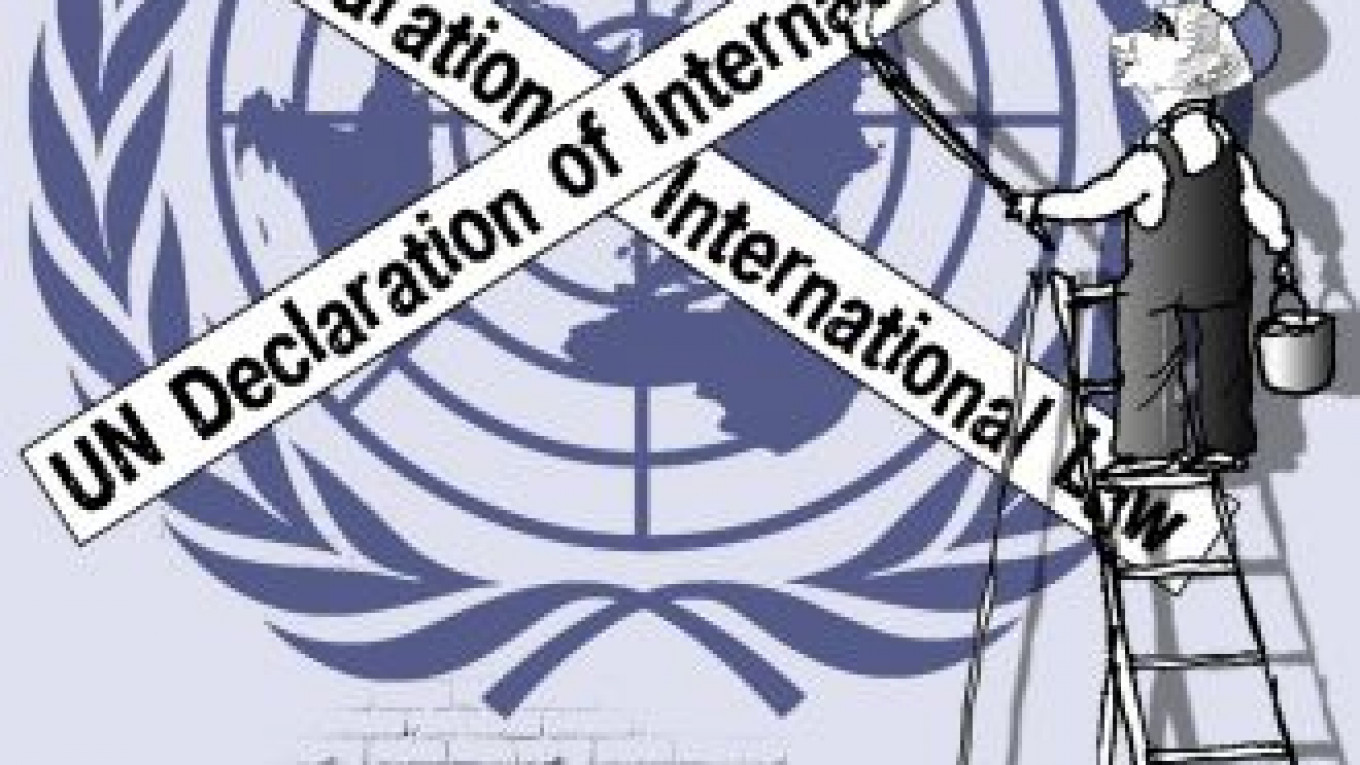If each United Nations member state were asked whether it meets the requisite criteria for "civilized globalism" at the UN General Assembly later this month, every ambassador would no doubt reply "yes." That is to be expected, because every country wants to project a positive image.
But outward appearance does not always match the deeper reality, and, in fact, it is often at conflict with it. There are many examples and many reasons for the divergency, including political, economic, legal and ideological considerations. A serious look at the substance and evolution of modern international relations provides convincing evidence of this. Although positive trends are evident, a certain "critical mass" has also led to a host of problems and negative developments. They include:
- a crisis of statehood that the UN estimates threatens more than 50 member states;
- the egoism and self-centeredness of individual states such as the United States and of international organizations such as NATO and the European Union, and their desire to assume a leadership role in global governance and international arbitration in order to impose their own model of the global order for the 21st century;
- a double standard in foreign policy;
- international legal nihilism;
- a belittling of the role of the United Nations, authoritative intergovernmental institutions; * Russophobia, which tarnishes the work of the U.S. Congress, the European Parliament, the Parliamentary Assembly of the Council of Europe and the NATO Parliamentary Assembly;
- and the direct intervention by Western countries in the internal affairs of sovereign states with the use of modern technologies such as the Internet and social networks in order to support and encourage the pseudo-legitimate theory of "color revolutions."
Considering that these factors have helped destabilize the international system and have made it more turbulent and inefficient, it would be difficult to contend that all of the players on the world stage demonstrate truly civilized behavior.
Without a doubt, we need real and systemic corrective measures, the optimization of peace building based on principles of law and justice and compulsory observance of all the provisions of the UN Charter. These should be developed at the national and intergovernmental levels.
The Russian Federation has put its civilizing principles into practice by acting as an example of the integrative approach while serving as one of the leading ideologues, architects and builders of the world order.
A confirmation of this is the May 7 decree by President Vladimir Putin "On measures for implementing the foreign policy of the Russian Federation." This document was a milestone of his first 100 days as president, addressing not only the country's interests but also focusing on the creation of an effective multipolar world amid the challenges and threats of the new century. The central element of the Russian approach is the universal observance and improvement of international law. This is a unique legal instrument that incorporates both historical considerations and the demands of the future, a civilizing paradigm reflecting the evolution of the international community. The document is the foundation of national programs for promoting the progressive development and effective implementation of international law.
There is a need for a similar project on a wider scale, specifically a UN Declaration of International Law. Such a document would set out the responsibilities each state holds before the international community to provide for the progressive development and codification of international law, make observance of its basic principles imperative and improve administration of the law in the context of modern geopolitics and geo-economics.
With time, the practical result of such activities could be the development of a codex of civilized behavior for states and other international entities. Because the Russian proposals are pragmatic, universal, appropriate to international processes and meet a definite need, they should be presented as diplomatic initiatives. One of the most practicable — and one that will be supported by a majority of the UN member states — is the declaration of the next Decade of International Law (2015-2025) under the auspices of the United Nations.
Vasily Likhachev, formerly Russia's ambassador and permanent representative to the European Union in Brussels, deputy chairman of the International Affairs Committee in the Federation Council and a deputy justice minister, is now serving as a Communist deputy in the State Duma.
Related articles:
>A Message from The Moscow Times:
Dear readers,
We are facing unprecedented challenges. Russia's Prosecutor General's Office has designated The Moscow Times as an "undesirable" organization, criminalizing our work and putting our staff at risk of prosecution. This follows our earlier unjust labeling as a "foreign agent."
These actions are direct attempts to silence independent journalism in Russia. The authorities claim our work "discredits the decisions of the Russian leadership." We see things differently: we strive to provide accurate, unbiased reporting on Russia.
We, the journalists of The Moscow Times, refuse to be silenced. But to continue our work, we need your help.
Your support, no matter how small, makes a world of difference. If you can, please support us monthly starting from just $2. It's quick to set up, and every contribution makes a significant impact.
By supporting The Moscow Times, you're defending open, independent journalism in the face of repression. Thank you for standing with us.
Remind me later.






